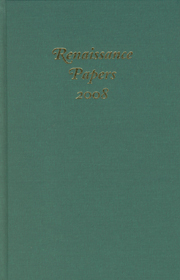Book contents
- Frontmatter
- Contents
- Renaissance Papers
- Cardinal Wolsey: The English Cardinal Italianate
- Pope Gregory and the Gens Anglorum: Thomas Stapleton's Translation of Bede
- The Spenserian Paradox of Intended Response
- Lucan, Marlowe, and the Poetics of Violence
- Hell Is Discovered
- Private and Public Plays in the Private Theaters: Speculation on the Mercenary Methods of Second Paul's and Second Blackfriars
- Staging Dismemberment in Early Modern Drama: Playing Mnemonics and Meaning
- Serving Theater in Volpone
- Troilus and Cressida: An Epitaph for the History Play
- “What thing thou art, thus double-formed”: Naming, Knowledge, and Materialism in Paradise Lost
Troilus and Cressida: An Epitaph for the History Play
Published online by Cambridge University Press: 12 September 2012
- Frontmatter
- Contents
- Renaissance Papers
- Cardinal Wolsey: The English Cardinal Italianate
- Pope Gregory and the Gens Anglorum: Thomas Stapleton's Translation of Bede
- The Spenserian Paradox of Intended Response
- Lucan, Marlowe, and the Poetics of Violence
- Hell Is Discovered
- Private and Public Plays in the Private Theaters: Speculation on the Mercenary Methods of Second Paul's and Second Blackfriars
- Staging Dismemberment in Early Modern Drama: Playing Mnemonics and Meaning
- Serving Theater in Volpone
- Troilus and Cressida: An Epitaph for the History Play
- “What thing thou art, thus double-formed”: Naming, Knowledge, and Materialism in Paradise Lost
Summary
WHEN the Prologue to Shakespeare's Troilus and Cressida, having summed up the action of the Trojan War thus far, informs his “fair beholders” that the play is in the process of “Beginning in the middle,” we catch a glimpse of what appears to be the familiar in medias res convention of classical epic. But it is only a glimpse, given the Prologue's breathless gloss on the convention and the indecorous haste with which the play will proceed to enact it. His proleptic paraphrase of beginning in the middle explains that the play “Leaps o'er the vaunt and firstlings of these broils” (27), after which it can be observed “starting thence away” (28). The verb leaps and the participle starting suggest headlong, pell-mell, unconsidered activity. Taken together, one on either side of “Beginning in the middle,” they erode the convention's claim to control the way the story is told. Although numerous critics have recognized the ways in which the epic pretensions of the play (including the Prologue) are continuously deflated, insufficient attention has been given to the kind of epic being held up for this treatment. Careful examination of the play in light of the Prologue, and especially its deployment of in medias res, provides support for the idea that in Troilus Shakespeare was interrogating Renaissance as well as classical ideas of epic by constructing a work that wittily embodies the cyclical, unstable nature of secularized history- something he and his historical personae had struggled to come to grips with in his two quasi-epical tetralogies about fifteenth-century England.
- Type
- Chapter
- Information
- Renaissance Papers 2008 , pp. 137 - 162Publisher: Boydell & BrewerPrint publication year: 2009



